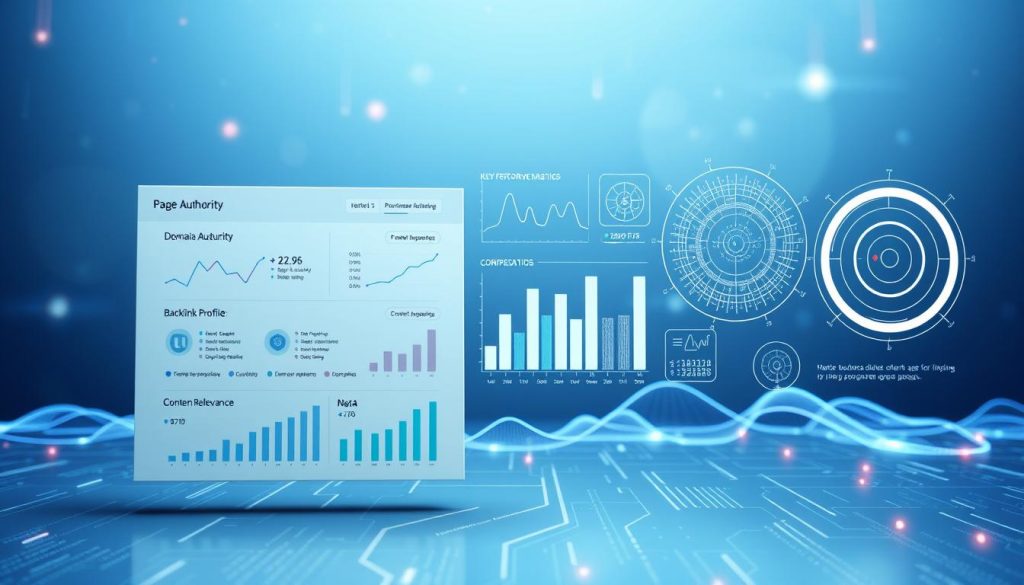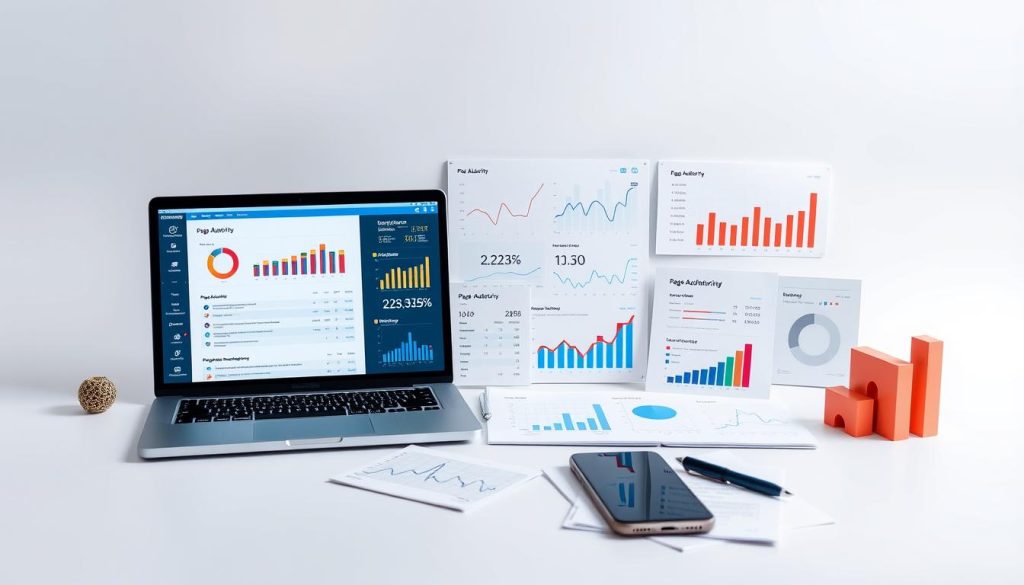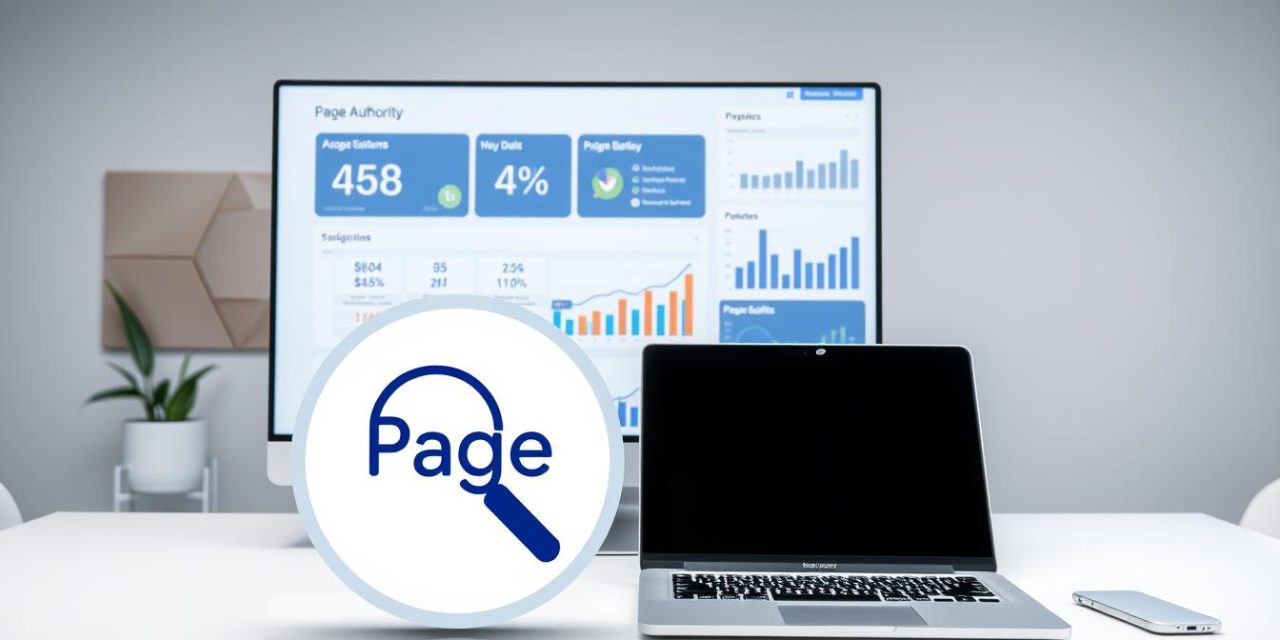Welcome to your friendly guide on a key concept in the world of search engine optimization. Have you ever wondered why some web pages appear at the top of search results? A major clue lies in understanding their page authority.
This score, like the one from Moz, predicts how well a specific web page might rank. It runs from 0 to 100. The score looks at many factors, such as the quality of backlinks and content.
While it’s not a direct Google ranking signal, it is a trusted predictor. Tracking this metric is essential for anyone wanting to improve their online visibility. This guide will give you practical insights you can use right away.
We will explore what this metric really means for modern SEO. You will learn how it differs from other measurements. More importantly, you will discover actionable strategies to boost your scores over time.
This resource breaks down complex ideas into friendly, digestible information. It empowers you to make smarter decisions for every part of your website. Let’s dive in and unlock the potential of your online presence.
Table of Contents
Key Takeaways
- Page authority is a score that predicts a webpage’s ability to rank in search engine results.
- It is measured on a scale from 0 to 100.
- This metric considers factors like backlinks and content quality.
- It is not a direct Google ranking factor but a reliable indicator.
- Improving your score can lead to better search engine visibility.
- Understanding this concept is crucial for effective SEO strategy.
Introduction to Page Authority and Its Importance
Understanding predictive metrics can transform your approach to search optimization. These tools help website owners gauge their potential performance. They provide valuable insights into search engine visibility.
What is Page Authority?
This scoring system predicts how well content might rank in search results. Developed by Moz, it uses a 0 to 100 scale. Higher numbers suggest better ranking potential.
The calculation considers multiple factors like backlink quality and content strength. It’s important to remember this is a predictive tool, not a direct ranking signal. Think of it as a helpful guide for improvement.
| Scoring System | Scale | Primary Use | Developer |
|---|---|---|---|
| Page Authority | 0-100 | Predictive ranking | Moz |
| Domain Rating | 0-100 | Domain strength | Ahrefs |
| Domain Authority | 0-100 | Domain predictive power | Moz |
Why It Matters in SEO
This metric helps prioritize optimization efforts effectively. It shows which content has the strongest ranking potential. This allows for smarter resource allocation.
Tracking changes over time provides concrete feedback on strategy effectiveness. You can see if your SEO improvements are working. This helps refine your approach for better results.
Comparing scores with competitors offers valuable benchmarking insights. It reveals opportunities for improvement. This competitive analysis drives strategic decisions.
The Fundamentals of Page Authority Measurements
Let’s explore the mechanics behind how these scores are actually calculated. Understanding the measurement system helps you interpret results correctly and set realistic expectations.
Understanding Moz Metrics and Scoring
The authority score uses a logarithmic scale from 0 to 100. This means moving from 20 to 30 is much easier than jumping from 70 to 80. The system reflects how search engines value incremental improvements.
Moz employs sophisticated machine learning to calculate these metrics. Their algorithms analyze vast amounts of web data, including link profiles and content signals. This continuous analysis ensures the scoring stays relevant.

Historical Trends and Machine Learning Impacts
Regular algorithm updates mean your numbers might fluctuate slightly. A small drop doesn’t necessarily mean your content worsened. It could reflect how the system weighs different factors.
Tracking scores over time reveals your true progress. Single snapshots don’t tell the whole story. Historical trends show whether your SEO efforts are working effectively.
Monitoring multiple pages across different periods helps identify patterns. You can spot which campaigns drive improvement. This data helps predict how long reaching target levels might take.
Factors Influencing Page Authority
Several key elements work together to determine how search engines perceive your content’s value. While many factors contribute to your score, some carry significantly more weight than others.
Role of Inbound Links and Backlink Quality
Inbound links from other websites serve as powerful trust signals. Each quality link acts like a vote of confidence in your content. Search engines view these links as endorsements of your work’s value.
Not all links are created equal. High-quality backlinks from authoritative domains in your industry matter most. A single link from a trusted source can outweigh dozens from low-quality sites.
The diversity of your link sources also impacts your score. Natural anchor text and relevant context strengthen each backlink’s value. Building a successful backlinking strategy focuses on earning these quality connections.
| Link Type | Quality Impact | Effort Required | Long-term Value |
|---|---|---|---|
| High-Quality Editorial | Very High | High | Excellent |
| Industry Directory | Medium | Low | Good |
| Low-Quality Spam | Negative | Low | Harmful |
| Social Media Shares | Low-Medium | Medium | Good |
Focus on earning links that naturally fit within the linking site’s content. This approach yields better results than chasing quantity alone. Quality always triumphs over sheer numbers in building sustainable authority.
Page Authority in Competitive Research
Competitive research transforms from guesswork to precision with page authority insights. Instead of setting random targets, you can now measure exactly where you stand against rivals.
Analyzing competitors’ scores gives you concrete benchmarks. You learn what level of optimization will help you compete effectively in search results.
Analyzing Competitors’ PA for Benchmarking
When you examine top-ranking pages in your niche, you gain valuable data. This information shows exactly how much ground you need to cover. If a competitor’s content has a score of 65 and yours sits at 35, the path forward becomes clear.
Regular monitoring helps spot trends early. You can respond proactively when competitors gain ground. This approach turns SEO strategy into a data-driven process with measurable progress.
| Competitive Scenario | Your Current Score | Recommended Action |
|---|---|---|
| Small Gap (10-15 points) | 40 | Focus on content refinement and internal linking |
| Medium Gap (16-30 points) | 35 | Combine content improvements with targeted link building |
| Large Gap (31+ points) | 25 | Consider creating superior content or targeting less competitive terms first |
| Leading Position | 70+ | Maintain quality and monitor for emerging competitors |
This competitive intelligence helps prioritize your efforts. You focus on opportunities where the gap is achievable. Understanding relative standings transforms your approach from guessing to strategic planning.
Utilizing Page Authority in Link Research
Building valuable connections online requires more than just finding websites – it demands strategic evaluation using page authority. This metric transforms your approach from random outreach to targeted campaigns that deliver real results.
When you’re presented with multiple linking opportunities, comparing scores helps you prioritize effectively. Imagine choosing between a feature on a high-scoring platform versus a lower-rated one. The decision becomes clear when you see the numbers.
Prioritizing External Link Building Opportunities
External link acquisition consumes significant resources. Focusing on high-value targets ensures your efforts pay off. Look for websites with strong individual pages rather than just domain-wide metrics.
Quality backlinks from authoritative sources provide the biggest boost. A single link from a well-regarded page can outweigh dozens from weaker sources. This strategic approach maximizes your return on outreach investment.
Optimizing Internal Linking Strategies
Don’t overlook the power of your own website’s structure. Your strongest pages can transfer value to newer content through smart internal linking. This creates a virtuous cycle of authority distribution.
Identify which of your existing pages have the highest scores. Use them as hubs to support fresh content. This internal strategy accelerates ranking without requiring external outreach.
Mapping your internal link hierarchy helps funnel equity to important conversion pages. It’s like having your own authority-building network right within your site.
Reporting and Monitoring Page Authority Performance
Your SEO strategy needs clear proof of progress to secure ongoing support and resources. Regular reporting transforms abstract optimization work into measurable business value that decision-makers can understand.

When you include this predictive metric in your performance reports, you create a quantifiable story of growth. This evidence becomes especially valuable when organic traffic results take longer to materialize than expected.
Tracking Improvements Through Regular Reports
Establishing a consistent reporting cadence reveals trends that single snapshots miss. You’ll see whether your strategies produce steady improvements or if your content stagnates despite your efforts.
Month-over-month data shows how link-building and internal linking practices gradually increase your scores. This long-term view provides concrete evidence of progress that justifies continued investment in SEO activities.
Interpreting Fluctuations for Troubleshooting
Smart reporting means understanding that slight variations are normal due to algorithm updates. The overall trend line matters more than month-to-month score changes for evaluating long-term success.
When you notice sudden drops in your metrics, quick investigation can identify issues like lost backlinks or technical problems. Early detection helps address concerns before they impact your search rankings.
Contextualizing the numbers ensures stakeholders understand that even when scores dip slightly, your content might remain healthy. Competitors may have improved faster, or the scoring algorithm may have been recalibrated.
Page Authority for Top Converters and Content Types
Your best-performing web assets deserve a focused strategy. These high-converting pieces are already proven winners. Giving them a boost can significantly impact your revenue.
Different kinds of content naturally build strength at different rates. In-depth guides and research-based articles often gain more traction than simple product descriptions. Recognizing these patterns helps you invest your efforts wisely.
Aligning High-Converting Content with PA Goals
It makes sense to prioritize the pages that drive real business results. By analyzing the scores of your top converters, you gain powerful insights. This approach ensures your work directly supports your most important goals.
When you see which content formats attract the most value, you can refine your strategy. Focus on creating more of what works best. This data-driven method maximizes the efficiency of your entire content plan.
Case Studies and Real-World Examples
Real-world examples show a clear pattern. Content with stronger metrics tends to hold its position better during search engine updates. This stability protects your traffic and conversions when others see drops.
Strategic investment in your best content creates a powerful cycle. As these pieces rank higher, they naturally earn more quality links. This further increases their value, creating a compounding benefit for your entire site.
| Content Type | Typical Score Range | Conversion Potential | Recommended Focus |
|---|---|---|---|
| Comprehensive Guides | Medium-High | High | High Priority |
| Product Pages | Low-Medium | High | High Priority |
| Blog Posts | Variable | Medium | Strategic Selection |
| Landing Pages | Low | High | Technical Optimization |
Enhancing Authority Through Quality Content
At the core of every high-ranking web asset lies one undeniable truth: content quality matters most. This foundation supports everything else in your SEO strategy.

Creating Informative and Relevant Content
Great content serves your audience while signaling value to search engines. It answers real questions and solves actual problems people face.
When you focus on creating genuinely useful material, something remarkable happens. Other websites naturally link to your work without aggressive outreach campaigns.
Search engines have become incredibly sophisticated at recognizing when content truly serves user needs. They reward comprehensive, accurate information that demonstrates real expertise.
The relationship between content quality and search performance works both ways. Better material attracts stronger links, which improves your visibility. This increased visibility then brings more potential linkers to your work.
Focus on creating shareable content that people want to reference. This approach taps into the most powerful authority-building mechanism available: voluntary links from satisfied readers.
Relevant content that matches search intent performs better across all metrics. Engagement signals like time-on-page tell search engines your material deserves visibility. This creates a sustainable cycle of improvement for your search engine positioning.
Investing in content excellence builds assets that deliver value long after publication. It’s not just good SEO practice—it’s smart business strategy that creates lasting digital strength.
Advanced Techniques for Boosting Page Authority
Visual storytelling elevates your SEO analysis from number-crunching to strategic insight. Advanced methods go beyond basic link building to reveal hidden growth opportunities.
Sophisticated approaches include content consolidation and strategic redirects. These techniques transfer value between your web assets efficiently.
Integrating Visual Data for Better Insights
Charts and graphs make complex metrics instantly understandable. They reveal patterns that raw numbers might hide.
Color-coded dashboards help identify your strongest content quickly. You can spot trends and opportunities at a glance.
Visual tools create compelling reports for stakeholders. They demonstrate progress clearly, securing support for continued SEO investment.
| Visualization Type | Primary Benefit | Best Use Case | Implementation Difficulty |
|---|---|---|---|
| Trend Line Charts | Shows progress over time | Long-term strategy review | Low |
| Competitive Comparison Graphs | Benchmarks performance | Gap analysis | Medium |
| Heat Maps | Identifies strength patterns | Website section analysis | High |
| Link Acquisition Timelines | Tracks campaign effectiveness | Outreach program evaluation | Medium |
These visual techniques accelerate decision-making significantly. They help you respond to changes before they impact your search performance.
Tools and Best Practices for Measuring Page Authority
The digital landscape offers various platforms designed to monitor search performance metrics. These analytical instruments help you track progress and make informed decisions.

Overview of Key SEO Tools
Moz Link Explorer provides comprehensive tracking for your content’s performance. This platform shows how optimization efforts lead to gradual improvements over time.
AgencyAnalytics specializes in visual reporting that clearly demonstrates value to clients. Both platforms integrate multiple data sources for complete SEO insights.
« The right measurement tools transform complex data into clear strategic direction. »
Understanding the difference between individual content strength and overall domain performance is crucial. This knowledge helps develop more sophisticated optimization strategies.
| Tool | Primary Strength | Best For | Integration |
|---|---|---|---|
| Moz | Original metric source | Detailed analysis | Multiple data streams |
| AgencyAnalytics | Visual reporting | Client presentations | Comprehensive dashboard |
Leveraging Data to Refine Your Approach
Effective measurement goes beyond simply checking numbers. Analyze trends and identify patterns that reveal what truly impacts your search performance.
Establish consistent tracking schedules to monitor both your content and competitor websites. Combine quantitative data with qualitative analysis for best results.
Professional SEO tools help correlate score changes with specific activities. This reveals which optimizations deliver the most significant impact.
Effective Strategies to Improve Page Authority
Creating a solid plan is your first step toward stronger search performance. You need clear targets that match your current situation.
Start by looking at your current numbers. If your score sits around 25, aiming for 50 makes sense. Trying to reach 80 too quickly often leads to frustration.
Setting Realistic Goals and Performance Targets
Good scores typically fall between 50 and 70. This range gives you a helpful benchmark. Your specific targets should come from competitor analysis and your own history.
Historical data shows how past improvements affected your traffic and rankings. This helps you calculate how much growth you need to hit business targets.
Benchmarking Against Competitors and Historical Data
Check what scores your top competitors have for your target keywords. If they all sit above 60, that becomes your minimum goal for page-one visibility.
Building domain authority alongside individual page strength creates powerful synergy. A stronger overall domain makes it easier for all content to gain traction.
Practical improvement strategies include earning quality backlinks and creating comprehensive content. Smart internal linking distributes value throughout your site. Regular monitoring lets you adjust your approach based on what actually works.
Remember that improvement is a marathon, not a sprint. The best strategies are those you can maintain over time. This gradual approach builds the signals search engines use to recognize quality.
Integrating these methods with a solid domain improvement plan creates lasting results. You’ll see better rankings and increased organic traffic as your scores grow.
Conclusion
Mastering the concept of page authority gives you a powerful edge in the digital landscape. This knowledge enables smarter decisions that systematically enhance your website’s performance in search engine results.
We’ve journeyed through the mechanics and importance of this metric. You now have practical strategies to boost your rankings and organic visibility.
Remember, improvement is a continuous process. Apply these techniques consistently to see your SEO efforts translate into better search rankings over time.
Your path forward is clear. Start by auditing your content, set achievable goals, and focus on building quality. The reward is increased visibility and sustainable growth.
FAQ
What exactly is Page Authority?
Page Authority is a score, developed by Moz, that predicts how well a specific webpage will rank on search engines. It uses a machine learning model to generate a score from 1 to 100.
Why is Page Authority an important metric for my website?
This metric helps you understand the ranking potential of your content compared to competitors. A higher score suggests your site is more likely to appear in search results, which can lead to more organic traffic.
How can I check my site’s Page Authority?
You can use various SEO tools to check this score. MozBar is a popular browser extension, and platforms like AgencyAnalytics provide detailed reports that include this and other vital metrics.
What’s the difference between Page Authority and Domain Authority?
While Page Authority predicts the ranking strength of a single webpage, Domain Authority measures the overall strength of an entire domain. Both scores are important for a complete SEO strategy.
What are the main factors that influence Page Authority?
The quantity and quality of inbound links are major factors. High-quality backlinks from reputable sites can significantly boost your score. The overall content quality on your site also plays a crucial role.
How often does Page Authority update?
The score is recalculated regularly as search engine algorithms evolve and new data is processed. It’s normal to see fluctuations over time.
Can I improve my Page Authority?
Absolutely! Focus on earning high-quality backlinks and creating outstanding content that others naturally want to link to. Improving your internal linking structure also helps distribute ranking power throughout your site.
Is Page Authority a Google ranking factor?
No, it’s not a direct ranking factor used by Google. It’s a third-party metric designed to predict rankings. However, the factors that influence it, like link quality, are essential for SEO success.
How long does it take to see an improvement in my score?
A> Improving your metrics is a long-term effort. It takes time to build quality links and for search engines to recognize your efforts. Consistency is key.
Should I only focus on pages with a high Page Authority?
Not at all. While important pages should have a strong score, every piece of content on your site matters. Use tools to identify lower-performing pages and find opportunities for improvement.





